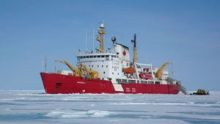Your recent edition (No. 5, February 1, 2011) presented a useful and timely analysis of why the Arctic is so important to the world and why Ukraine should bother with it. In those same pages, another one of your articles talked about the participation of Ukrainian sculptors in the world’s most famous international ice sculpture festival, now taking place in Quebec City, my hometown. Both articles resonated with me personally because, as a Canadian, the North is part of who I am.
With 40 percent of its land mass in the Arctic territories, 162,000 km of Arctic coastline and occupying 25 percent of the entire Arctic region, Canada is undeniably an Arctic nation. Indeed, to understand Canada you must know the Arctic. It is embedded in our history, in our culture and in our soul.
I agree that Ukraine should pay more attention to the Arctic. Climate changes have global effects, for all countries, and are generating human and ecological catastrophes. We all have a role to play in protecting the people and environment of the Arctic. Whether it is through the United Nations, the Arctic Council or NATO, Canada is committed to work with other nations to develop an appropriate international enabling environment for sustainable development in the Arctic. Cooperation, diplomacy and respect for international law should be the hallmarks of our approach. The entire international community must work together to ensure that the potential of the Arctic is not squandered by pollution and near-sighted actions. That said, we know that stewardship and good governance must begin at home. The development of the North is not a hockey tournament open to all nations. Unlike the continent of Antarctica, which has no permanent population and is subject to an international treaty, the Arctic is composed of sovereign countries, which are responsible for the well-being of their inhabitants.
The Arctic is of growing interest to many countries, some as far away as in Asia, as pointed out in your article. But it does not reflect the full reality to write that “the US, Canada, Denmark, Norway and Russia are the main competitors” for the development of the Arctic. To the contrary. By virtue of their sovereignty, these five coastal states have unique responsibilities in the Arctic Ocean, Canada and Russia being the major Arctic powers as together we account for more than three quarters of the coastline of the Arctic Ocean. Maritime disputes exist in the North, but they are well managed. And sovereignty is not just about resolving boundary issues.
Canada exercises its sovereignty daily through good governance and responsible stewardship, whether related to social and economic development, Arctic science and research, environmental protection, the operations of the Canadian Forces or the activities of our Coast Guard. Canada made strategic investments critical for the sustainable development of the North, in terms of both protecting the fragile environment and ensuring safe navigation. Canada established the world-class High Arctic Research Station in Nunavut: a year-round, multidisciplinary facility exploring the cutting-edge of Arctic science and technology issues. Canada has made a strong commitment to Arctic science — the foundation for sound policy and decision making on the environment. Indeed, Canada was the single-largest contributor to the International Polar Year, taking partnerships in circumpolar research to new levels.
As early as in 1970, Canada unilaterally adopted the Arctic Waters Pollution Prevention Act, asserting Canada’s right to enforce a strict pollution-prevention regime in its ice-covered waters out to 100 nautical miles from its lands or islands. In August 2009, the application of the Act was extended from 100 to 200 nautical miles, consistent with Article 234 of the United Nations Convention on the Law of the Sea, and mandatory ship reporting was adopted to prevent, reduce and control marine pollution from vessels. These regulations are not about preventing access. They are about allowing access, while at the same time ensuring responsible management of a particularly vulnerable marine environment. As the potential for traffic increases in the North, it is critical that Arctic states have the capacity to respond in the event of an incident.
The North is the home to complex and fragile ecosystems that must constantly adapt to survive in a sometimes harsh and unforgiving climate. It is home to a wealth of natural resources and burgeoning economies. Above all, it is home to more than 125,000 Canadians who live, work and thrive in bustling yet remote, in numerous but small communities. The well-being of our Northern people is at the heart of all of Canada’s actions in the Arctic.







